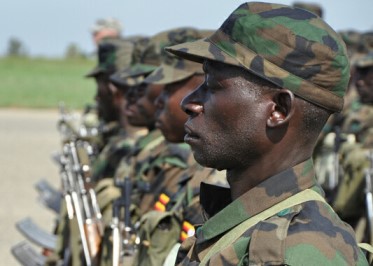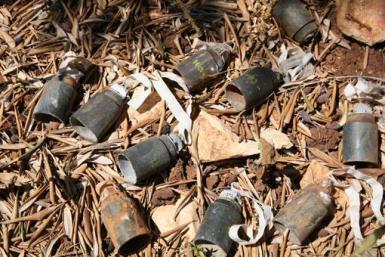South Sudan, Uganda urged to probe cluster bomb use in conflict
February 17, 2014 (JUBA) – There are growing calls for the South Sudanese and Ugandan governments to launch an investigation into allegations that banned cluster bombs were used during the recent conflict, which erupted in the capital, Juba, mid-December.

It also called on both governments to take steps to ensure the independence and impartiality of any investigation by involving international experts, and cooperating with relevant organisations.
“The young nation of South Sudan has enough problems without these horrific weapons, which kill and keep on killing long afterward”, said Steve Goose, arms division director at HRW and chair of the Cluster Munition Coalition (CMC). “The governments involved should quickly find out who is behind this and make clear they will be held responsible.”
CLAIMS MUNITIONS CAME FROM OUTSIDE
A coalition of South Sudanese human and civil rights advocacy groups has also called for the formation of an independent technical committee to investigate the alleged existence of cluster bombs, claiming the munitions most likely came from outside the country.
A team from the UN Mine Action Service (UNMAS) found remnants of the weapons, including intact unexploded sub-munitions or “bomblets”, earlier this month, along a section of road near the Jonglei capital Bor. The discovery was made in an area not known to be previously contaminated prior to the outbreak of violence.
According to UNMAS, the site was contaminated with the remnants of up to eight cluster bombs and an unknown quantity of bomblets, which are dropped by fixed wing aircraft or helicopters.
Following the discovery UN secretary-general Ban Ki-moon issued a statement condemning the use of cluster bombs in the South Sudan conflict. However, the agency has yet to provide any further details on the origin of the munitions or who might be responsible.
UGANDA DENIES ALLEGATIONS
South Sudan’s defence minister, Gen. Kuol Manyang Juuk, has strongly denied that any cluster munitions have been used in the conflict, telling the Citizen newspaper the accusations are “total lies”.
Bor changed hands several times in clashes between government forces loyal to president Salva Kiir and rebels aligned with former vice-president Riek Machar, with much of the town now in ruins.

However, HRW says there is no evidence to suggest the SPLA – which previously functioned as a rebel armed force – had any involvement in the production, export, use, or stockpiling of cluster munitions. Following its independence from the north in 2011, South Sudan authorities maintained the country was neither a user nor producer of cluster munitions.
The commander of the Ugandan forces in South Sudan, Brig. Muhanga Kayanja, told HRW that his forces had used helicopters to provide close aerial support to ground troops, but denied using any bombs during the conflict.
The Ugandan army spokesperson has confirmed that two battalions, totalling at least 1,600 soldiers, are currently in South Sudan.
The decision to deploy Ugandan troops has been controversial, with the international community calling for their withdrawal amid accusations troops continued to violate the terms of a ceasefire deal signed on 23 January.
Some members of the Ugandan parliament have also raised concerns about the UPDF’s operational parameters and neutrality in the conflict.
MILITARY STRIKES
HRW said there had been reports of Ugandan helicopter strikes near Bor at the same time as the South Sudanese government began a counter-attack on rebel positions on 21 December, with one military officer quoted by Reuters as saying its MiGs had carried out two bombings in the area.
In 2007, a Ugandan government representative admitted at an international meeting that Uganda possessed a stockpile of cluster bombs that it would destroy, although officials later denied Uganda had ever acquired or used cluster munitions.
South Sudan is not a party to the 2008 Convention on Cluster Munitions, which comprehensively bans cluster munitions. Uganda signed the convention in 2008, but has yet to ratify it. If South Sudanese forces are found to be responsible for the use of cluster bombs, Uganda could still be found to be in violation of the convention by virtue of its close military cooperation with the new nation.
Cluster munitions can be fired by rockets, mortars, and artillery, or dropped by aircraft. They explode in the air, sending dozens, even hundreds, of sub-munitions over a wide area. Many fail to detonate on impact and become de facto landmines, killing and maiming people long after a particular conflict has ended.
(ST)
